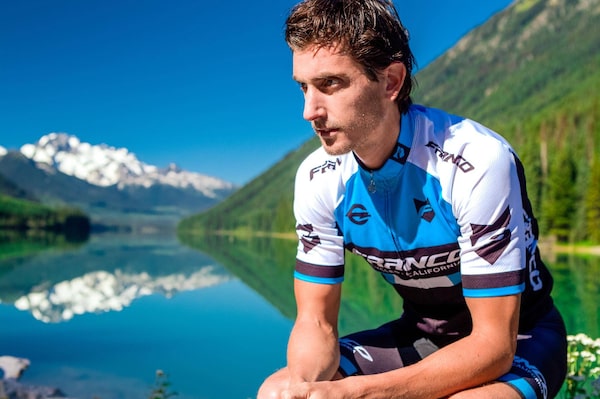
Brendan Brazier.Dan Barham/The Globe and Mail
He's a former Ironman triathlete and two-time Canadian 50k ultramarathon champion, the vegan author of the bestselling Thrive books, and a co-founder of the food and supplement company Vega, which sold in 2015 for $550-million (U.S.). Raised in North Vancouver, B.C., and currently living in bohemian Topanga Canyon, Calif., Brendan Brazier spends his fair share of time in planes, trains and automobiles, and has lots of tricks for resting and rejuvenating in transit – not to mention the art of avoiding airport food.
Travelling salesman
I used to travel a lot more in the early days of Vega. Right now, my main places to travel are Vancouver and New York and San Francisco. I'm travelling at least a week out of every month, but sometimes closer to two weeks. It used to be speaking engagements, but now it's more business meetings. Charles Chang, who started Vega with me, has started a fund called Lyra Growth Partners. That's helped me invest in a bunch of startups. I was in Montreal last month looking at one of the new companies we invested in there, called RISE Kombucha.
Road rules
The reason I was on the road a lot [in the beginning] was giving talks at Whole Foods, so it got me into a good pattern. There's all this amazing food right there! Since then, I've found I've really become a grazer. I don't really depend on meals so much anymore. So there's really simple things you can find in even just the basic grocery stores. Nuts and seeds and fruit and vegetables. I like sprouted bread quite a lot, with avocado. Very basic, single-ingredient cereal. Dinner is usually a salad and rice and vegetables, or quinoa and vegetables. Things that are actually really quite easy to find. The places I go – Vancouver and New York and Los Angeles – have amazing plant-based restaurants, but even regular restaurants will now do a plate of rice and vegetables.
Rocket fuel
I'm noticing there are better places showing up in airports now, that even two years ago just didn't exist. There are sushi places where you can get an avocado roll, and Asian places where you can get stir-fried vegetables and rice. I do travel with food that's easy to snack on, too, and easy to travel with. Rice cakes, for example, are one ingredient. I'll have that with some walnuts. It's very basic food, but I think, over the years, my palate has changed. I really appreciate simple food.
Rest stop
Often before going away, I'll try and bank a little bit of sleep. I do find that works. If I am a little overrested going into a big travel session, I find it a little easier. I'm pretty lucky in that I don't have any problems sleeping. I can sleep really anywhere and get a good night's sleep. If I'm eating well, too, my cortisol levels will be lower, which allows for better quality, deeper sleep. So that comes back to diet as well. Also, having a good plan. Planning out your day and your week, and figuring out when you are going to get rest, and how much rest you're going to get.
Fit bit
The places I go on a regular basis, such as Vancouver and New York, I go to gyms there. I know where they are, and there's no surprises. But running, of course, is my main thing. Vancouver is my absolute favourite place to run. So that's really easy. Other places, if I am going somewhere new that I haven't been before, and I can't find a gym and I can't find a running route, there's plyometric exercises that you can do in any hotel room. In 35 to 45 minutes, you can get in a really good workout that just uses body weight.
Headspace
Running is a great way to multitask. You can get in a workout, but you can also help clear your mind. That's really why I run now. I don't race competitively any more, so running for me is just a time to reflect on things. It really helps me to reset and focus.
Sometimes answers to questions you're not even thinking about will pop up. I've actually read about that quite a bit – how the subconscious works and how there is science behind that. A meditative state can be really beneficial, whether it is traditional meditation or active meditation like running.
This interview has been condensed and edited.